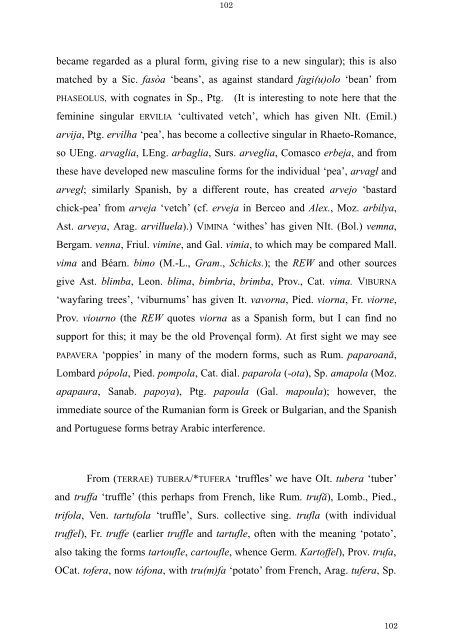The Latin Neuter Plurals in Romance - Page ON
The Latin Neuter Plurals in Romance - Page ON
The Latin Neuter Plurals in Romance - Page ON
You also want an ePaper? Increase the reach of your titles
YUMPU automatically turns print PDFs into web optimized ePapers that Google loves.
102<br />
became regarded as a plural form, giv<strong>in</strong>g rise to a new s<strong>in</strong>gular); this is also<br />
matched by a Sic. fasòa ‘beans’, as aga<strong>in</strong>st standard fagi(u)olo ‘bean’ from<br />
PHASEOLUS, with cognates <strong>in</strong> Sp., Ptg. (It is <strong>in</strong>terest<strong>in</strong>g to note here that the<br />
fem<strong>in</strong><strong>in</strong>e s<strong>in</strong>gular ERVILIA ‘cultivated vetch’, which has given NIt. (Emil.)<br />
arvija, Ptg. ervilha ‘pea’, has become a collective s<strong>in</strong>gular <strong>in</strong> Rhaeto-<strong>Romance</strong>,<br />
so UEng. arvaglia, LEng. arbaglia, Surs. arveglia, Comasco erbeja, and from<br />
these have developed new mascul<strong>in</strong>e forms for the <strong>in</strong>dividual ‘pea’, arvagl and<br />
arvegl; similarly Spanish, by a different route, has created arvejo ‘bastard<br />
chick-pea’ from arveja ‘vetch’ (cf. erveja <strong>in</strong> Berceo and Alex., Moz. arbilya,<br />
Ast. arveya, Arag. arvilluela).) VlMINA ‘withes’ has given NIt. (Bol.) vemna,<br />
Bergam. venna, Friul. vim<strong>in</strong>e, and Gal. vimia, to which may be compared Mall.<br />
vima and Béarn. bimo (M.-L., Gram., Schicks.); the REW and other sources<br />
give Ast. blimba, Leon. blima, bimbria, brimba, Prov., Cat. vima. VlBURNA<br />
‘wayfar<strong>in</strong>g trees’, ‘viburnums’ has given It. vavorna, Pied. viorna, Fr. viorne,<br />
Prov. viourno (the REW quotes viorna as a Spanish form, but I can f<strong>in</strong>d no<br />
support for this; it may be the old Provençal form). At first sight we may see<br />
PAPAVERA ‘poppies’ <strong>in</strong> many of the modern forms, such as Rum. paparoană,<br />
Lombard pópola, Pied. pompola, Cat. dial. paparola (-ota), Sp. amapola (Moz.<br />
apapaura, Sanab. papoya), Ptg. papoula (Gal. mapoula); however, the<br />
immediate source of the Rumanian form is Greek or Bulgarian, and the Spanish<br />
and Portuguese forms betray Arabic <strong>in</strong>terference.<br />
From (TERRAE) TUBERA/*TUFERA ‘truffles’ we have OIt. tubera ‘tuber’<br />
and truffa ‘truffle’ (this perhaps from French, like Rum. trufă), Lomb., Pied.,<br />
trifola, Ven. tartufola ‘truffle’, Surs. collective s<strong>in</strong>g. trufla (with <strong>in</strong>dividual<br />
truffel), Fr. truffe (earlier truffle and tartufle, often with the mean<strong>in</strong>g ‘potato’,<br />
also tak<strong>in</strong>g the forms tartoufle, cartoufle, whence Germ. Kartoffel), Prov. trufa,<br />
OCat. tofera, now tófona, with tru(m)fa ‘potato’ from French, Arag. tufera, Sp.<br />
102









